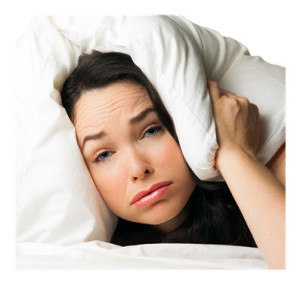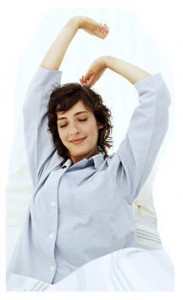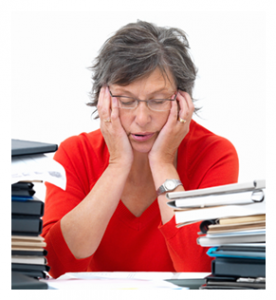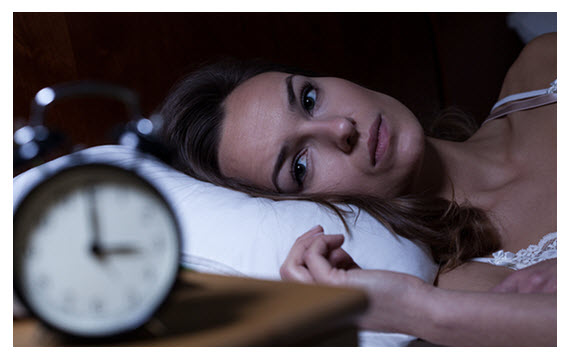It isn’t solely a problem for women in middle age, and nor is it solely a problem for women. Insomnia, sleep deprivation, and the need to improve sleeping habits are all part of a nationwide dilemma, as you have no doubt read many times.
 However, adequate sleep is definitely a challenge for women, in particular as we hit midlife. Attempting to revise my own sleeping routines to improve both quality and quantity of sleep is — and has been — an ongoing drama. Consequently, I thought a “sleep makeover” would make a worthy topic.
However, adequate sleep is definitely a challenge for women, in particular as we hit midlife. Attempting to revise my own sleeping routines to improve both quality and quantity of sleep is — and has been — an ongoing drama. Consequently, I thought a “sleep makeover” would make a worthy topic.
Some of the recommendations that follow are the usual suspects — bed at a regular hour, reducing caffeine — along with research you may find informative.
And, I hope to solicit your input relative to how you score your much needed Vitamin Zzzs, especially if, like me, you’re juggling an overfilled plate when it comes to commitments.
Women and Sleep
The point above about women and sleep?
Some sources say that women are twice as likely as men to have trouble getting to sleep, and the National Sleep Foundation reminds us of some of the reasons that more women report symptoms of insomnia than men:
Certain phases of the menstrual cycle, pregnancy, and menopause can all contribute uniquely to women’s sleep troubles. Sometimes, these biological changes disrupt sleep, but then unhealthy sleep habits maintain the pattern.
This same article points out that sleep disturbances can also be the result of depression, which raises the issue of the work-life balance concerns that women bear to a disproportionate degree. How many work-for-pay mothers and stay-at-home mothers are cutting dangerously into their night’s sleep? How often do women lie awake at night worrying about children and grandchildren? How often are we rising extra early to get a “jump” on the day — in part because of the nature and extensiveness of responsibilities we’re carrying?
How Many Ways Can We All Count Sheep?
eMedicine.net provides baseline information on women and sleeping problems, noting that:
The most common sleep problem in women is insomnia. This includes trouble falling asleep, staying asleep, or early awakening, and inability to resume sleep. Other common sleep disorders are sleep-disordered breathing, restless legs syndrome, periodic limb movement disorder, and narcolepsy.
I will also refer you to Web MD’s definition of REM and non-REM sleep, and this snippet on why adequate sleep is so critical:
During the deep stages of NREM sleep, the body repairs and regrows tissues, builds bone and muscle, and strengthens the immune system… As you get older, you sleep more lightly and get less deep sleep. Aging is also linked to shorter time spans of sleep, although studies show you still need as much sleep as when you were younger.
 “You still need as much sleep as when you were younger.” Did you get that?
“You still need as much sleep as when you were younger.” Did you get that?
(I’m making mental notes as the enormity of the challenge grows clearer. We have a harder time getting to sleep and staying asleep, but we need our sleep as much as ever.)
Chronic Sleep Deprivation = Bad News
Shall we add that prolonged periods of insufficient sleep leave our cognitive abilities scrambled?
Specifically, sleep deprivation impairs memory and concentration, along with mood, sex drive, and more. In fact, a 2013 New York Times article on chronic sleep deprivation pulls no punches, pointing out that “Chronic sleep deficiency has the potential to impact nearly all of our physiologic systems…”
As for menopausal and post-menopausal women, we know that lowered levels of estrogen can mean hot flashes and night sweats, neither of which are a recipe for sweet dreams.
eMedicineHealth.com tells us:
After menopause, women get less deep sleep and are more likely to awaken at night… There is also an increase on obstructive sleep apnea in post-menopausal women… Pain, grief, worry, certain medical conditions, medications, and breathing disorders may disturb sleep in menopausal and postmenopausal women.
Aging and Sleep Challenges
According to this article on changing sleep patterns as we age, it’s clear that we need to adjust expectations and possibly routines to achieve our much needed rest.
Compared to younger people, older adults: sleep fewer hours and take longer to fall asleep; sleep less deeply and wake up more often during the night; have more trouble adjusting to changes in sleeping conditions, such as a different bed; have changes in their sleep cycle; spend less time in the most restful stages of sleep.
As we grow a little older, we may also be grappling with bodily systems that don’t work the way they once did. Spicy wings at night? Fine at 35, but not so much 10 years later.
Tougher to adjust to — we may be dealing with concerns at middle age that include emergent or worsening sleep disorders, an unanticipated set of “life event” concerns, and obstructions to falling asleep and staying asleep like pain or depression. I will add that a partner who snores, however much you may love him, can be a significant impediment to a much needed night’s sleep. Solving that one may require delicate handling.
AARP on the “Worry” Factor
This AARP health article addresses reasons that women in their 50s in particular struggle to get sufficient sleep.
… For women in their 50s, it [insufficient sleep] could be a result of hormonal changes combined with the stress of work and family that may be disrupting sleep patterns.
I’m glad to see that AARP doesn’t shortchange this factor, which I believe deserves to be fully fleshed out. It’s damn difficult to find yourself caring for people on both ends of the spectrum — people you love — and caught in the consequences of a constant juggle that eats up your time both day and evening, and requires that you sacrifice a chunk of your sleep.
AARP goes on to describe women in their 50s as:
… a sandwiched group who has family, not only children but also probably elderly parents, but still you’re likely to be in the workforce, so you get squeezed at both ends in terms of family responsibility and job responsibility…
What else?
 Worries about keeping our jobs if we still have them; our spouses, relationships or dating lives; changes in sexual desire and sexual marketability; physical changes that cause us psychological distress; issues to do with money…
Worries about keeping our jobs if we still have them; our spouses, relationships or dating lives; changes in sexual desire and sexual marketability; physical changes that cause us psychological distress; issues to do with money…
Exercise and Sleep
Personally, I’ve always found that I sleep better when I’m getting regular exercise. But it never occurred to me that the timing of that exercise could be critical. I was surprised when I came upon this little nugget in another article on women and insomnia, also from the National Sleep Foundation:
One recent study found that overweight, post-menopausal women who exercise in the morning experience less difficulty falling asleep and better quality sleep than evening exercisers.
Before children, I did my daily walking at 5, 6, or 7 a.m. before my workday began. Once I was a working mother, the only time of day with the flexibility to exercise was typically in the evening, if at all. That habit stuck. I may need to reconsider walking that I usually do at 6 or 7pm that is good for my overall health, but lousy for my ability to sleep.
My Sleep Improvement Initiative
WebMD offers recommendations on coping with changing sleep patterns, many of which I’m sure you’ve heard, including:
Get regular exercise… Keep the bedroom cool, quiet, and dark… Get out of bed if you are unable to sleep, and do a quiet or boring activity until you feel sleepy… Follow the same evening and bedtime routines…
As I take those suggestions into account along with knowledge of my own opportunities and constraints, I’m working on a Sleep Improvement Initiative that I hope will bear fruit. My plan is as follows:
- Create a more relaxing atmosphere in my bedroom
- Be diligent about a new med that should ease pain and help with sleep
- Reduce caffeine (yet again); no coffee after 2pm
- Change the timing of my exercise to morning or midday
- Introduce a “regular” sleeping hour into my routine
- Do a better job of boundaries around work time and personal time
That first? A topic for another day.
Those last two items?
Sure to be the toughest for me, as I still have difficulty with “no” to competing demands for my time, and likewise when a client needs something from me.
A Note on the Societal Component
We shouldn’t ignore the societal elements or implications in this discussion. Sleep deprivation is a known problem, and one we typically slough off until the cumulative impacts have had their way with us in our culture of competing responsibilities, do more with less, job insecurity, and too few affordable options when it comes to childcare and eldercare.
For myself, I will simply say that I am frequently called upon to work long hours with little notice and across multiple time zones. As an independent worker, there is no such thing as paid time off or for that matter, a sick day. The result is the proverbial burning of the candle at both ends, and I can feel and see the negative impacts.
And the collective societal consequences?
How about the eventual increased burden on our healthcare system? How about the higher risk of accidents when sleep-deprived? How about the deleterious effects on quality of life?
Somehow, we must find a way to move sleep closer to the top of the priority list. I, for one, am going to try.
- Do you have problems falling asleep? Do you have problems staying asleep?
- What changes in habits to improve your sleep have worked for you? Do you have a bedtime routine?
- Are you using sleep aids — Over-The-Counter or prescribed — and do they help?
Enjoy more of the Makeover Series here.
You May Also Enjoy

One of the sweetest blessings I have in life, besides Suzy, is the ability to fall asleep quickly and soundly. I wonder how many folks who can do this, take that for granted?
A lot take it for granted, Jim, in my opinion. You are among the fortunate! 🙂
I have had different seasons of sleep. The first time I worked with a therapist was because of extreme anxiety which included insomnia. I truly did learn to value a bedtime routine, learned some relaxation exercises and began to make sleep a priority.
Of course, I can remember a season of three babies in less than four years…and that was a very sleepless season.
During the falling apart of my marriage, I can remember many nights where it was difficult to fall asleep or I would wake and be unable to fall back to sleep. The main difference that I recall was that I no longer became anxious during these spells, I felt like I had the tools to get back on track with relaxation techniques, prayer/meditation, routine. Instead of obsessing and stressing, I trusted what worked for me and that I would have a better experience on my next night.
I have taken over the counter sleep aids with fairly good success when I knew I was in a challenging season. These days, I might do that when things are different like my spouse is out of town, the children are gone or I have been unable to get physical exercise for a while.
The physical exercise makes a huge difference for me. And yes, I have to make sure it happens earlier than later (another enormous challenge). When I lack physical exercise, I deal with restless leg syndrome which causes me to jerk awake. Caffeine only bothers me if I’m already having difficulty, although I don’t make a habit of having caffeine late in the day.
Today, I still guard my bedtime. It is rare for me to vary my going to sleep and rising by more than an hour…even when my partner doesn’t join me. Sometimes that is frustrating, but it is still worth protecting what works for me.
I used to take a bath every single night prior to bed and that was an ideal routine because it literally became my catalyst for falling asleep. It was a great trigger for my body to relax. But, since moving in with Mr. Wonderful, there is no tub in our master bathroom area. The only tub in our home is through the bedroom that my boys share which is not ideal for THEIR sleep. Sigh. It is the great woe of my house!
I require 7 hours of sleep consistently, and thrive on eight. I can make do on less, but not for the long term.
I am in the midst of a pretty bad sleeping pattern myself at the moment, rarely sleeping past 3 a.m. The routines regarding exercise, no caffeine past 3 p.m., enjoyable surroundings, regular bed time are all on auto pilot. For the last several months I have taken a good nap on Saturdays and Sundays and it has helped. But come Friday late afternoon, I am not worth much. Will try some sleep aids next.
Cornelia, Any chance you have a sleep disorder kicking in… no pun intended? My waking after 1 and a half to 3 hours of sleep (and not being able to get back to sleep) — for nearly a decade — left me bewildered (and miserable). Turned out to be a sleep disorder that has reared its head again of late, but was nipped in the bud for many years.
I like Jim have no problem falling asleep!! I sleep too much but awaken tired always! Just found out why and hopefully can live LIFE a bit more!
I do exercise in the AM!!!
Want to sleep better? Vitamin B12 – Works Wonders.
I take B-12 Ron. It helps other things, but for those of us with sleep disorders, sometimes much more is required. (Good reminder though, thank you! Vitamin deficiencies can sometimes be easily addressed and they make a huge difference.)
I recently had a project where I had to write about sleep. It scared me a bit and I’m trying harder to get more sleep. It really is important.
Good luck to you in your quest for more sleep.
Certain yoga exercises will help your body and your mind relax more and prepare for sleep. Yoga reduces muscle tension, slows your heart rate and calms a racing mind and provides the perfect recipe for a good night’s sleep. There is growing evidence that small behavioral changes in the evening can make a big difference in getting a restful sleep.